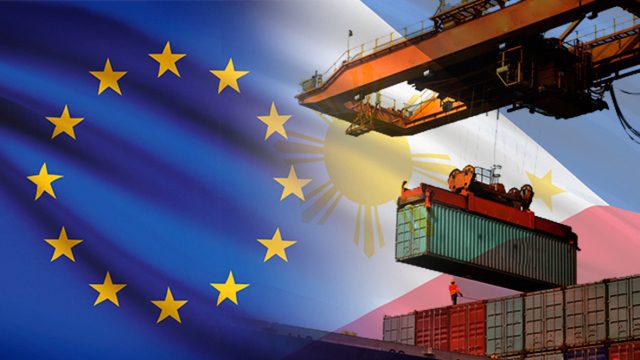SUMMARY
This is AI generated summarization, which may have errors. For context, always refer to the full article.

MANILA, Philippines – European business leaders urged the Philippine government to further ease customs procedures and hasten the implementation of the Association of Southeast Asian Nations (ASEAN) Single Window, among others.
The business leaders made the appeal as they cited recent reforms that have opened more opportunities for small and medium enterprises (SMEs).
The European Union on Tuesday, May 12, published its first consolidated industry-driven advocacy paper, zeroing in on specific regulatory issues that hamper a more favorable market environment between the two regions.
“Today, for the first time, the European companies operating in the Philippines have an advocacy paper which is the basis for a dialogue with the Philippine authorities,” EU Ambassador Guy Ledoux said in his speech at the event.
According to the Philippine Statistics Authority (PSA), EU investments grew by 58%, totaling about P50 billion ($1.12 billion) or over 25% of total new reported investments in the Philippines last year.
“Philippines-EU trade has not just been growing the last few years, it has grown to a record high of €12.5 billion ($14.09 billion) in 2014. That is more than 15% compared to 2013,” Ledoux said.
Wish list
To sustain and even improve the pace, European businessmen recommended “the elimination of non-tariff barriers to trade within ASEAN; the enhanced protection of Intellectual Property rights; and a rapid implementation of the ASEAN Single Window.”
The ASEAN Single Window is a regional initiative that connects and integrates the National Single Windows (NSWs) of member-states. This is seen to expedite cargo clearance within the context of increased economic integration in ASEAN.
The EU also recommended the easing of existing customs procedures and the liberalization of ownership and control rules in sectors where restrictions on foreign ownership exist.
Should these recommendations be implemented by the government, Ledoux said European countries and the Philippines will make the most of the recent improvements and reforms made by the regions.
In January, the EU more than doubled its grant to the Philippines to €325 million (P17 billion or $366.39 million) for 2014-2020, channeling “a more than proportional amount” of it to Mindanao as part of the bloc’s contribution to the peace process.
This was after the Philippines was included to the EU’s zero-tariff trading scheme in December last year, which is seen to rake in €600 million ($676.41 million) worth of exports and generate 267,000 new jobs.
“We have heard ECCP Chairman Michael Raeuber calling for the adoption of the competition law, the customs modernization and tariff act, and the revision of the build-operate-transfer (BOT) public-private partnership (PPP) law, as well as further liberalization of foreign ownership limitations,” Ledoux said.
The EU head reiterated that these recommendations “are all important for the Philippines’ economic development.”
“They are also key determinants for further trade engagement with European industry,” he said.
Gov’t vows action
In response, Socio-economic Planning Secretary Arsenio M. Balisacan told the businessmen that the Philippine government vowed action on the businessmen’s wish list within the Aquino administration and beyond, and its continued support for the development of SMEs.
“The role of SMEs in economic development has gained significantly more attention in recent times. SMEs are especially important in Asia where trade and production links have been the key driver of growth for many Asian economies,” Balisacan said.
He added that in the ASEAN community, the SME sector accounts for about 96% of businesses and generates as much as 80% of total domestic employment.
The Philippine government welcomes the business-to-business cooperation with European Union SMEs, as partnership between Philippine and European firms in these priority sectors will certainly provide support for the attainment of more inclusive and sustained growth, Balisacan said.
“We’ll continue to take fundamental steps to promote competitiveness and workforce productivity. The highly competitive global markets require enhancing the competencies of our labor force,” Balisacan said.
To enhance the local labor force, the government will provide training programs, such as technical vocational education and training; harness science, technology, and innovation to further improve the value-added of the SMEs to the economy; and expand cluster development, he added.
“Let me also assure you of our support for the passage of critical priority bills such as the antitrust or competition law, that will undoubtedly help promote a more level playing field and promote the growth and development of SMEs,” Balisacan said.
Other than these reforms, the government said it will promote the rationalization of fiscal incentives and amendments to the BOT law.
“As we traverse the last few miles of this administration, the government will ensure that the attainment of our goals will be supported by the substantial engagement and strong partnership with the private sector, our development partners, and civil society,” Balisacan said. – Rappler.com
$1 = P44.79
€1 = $1.13
European Union flag image and container cargo on a crane image via Shutterstock
Add a comment
How does this make you feel?
There are no comments yet. Add your comment to start the conversation.